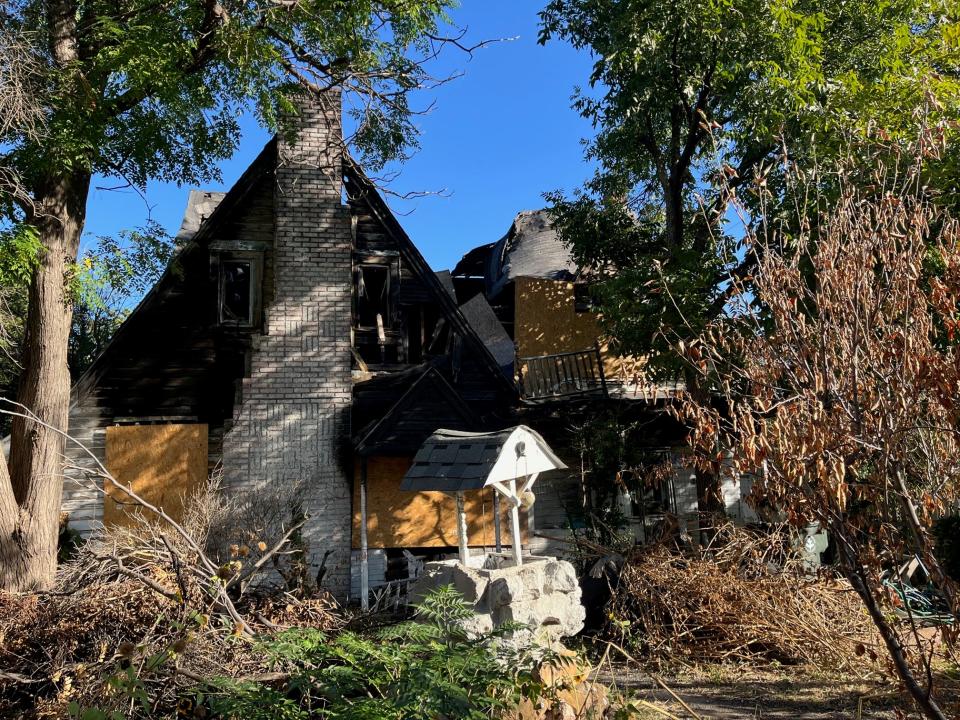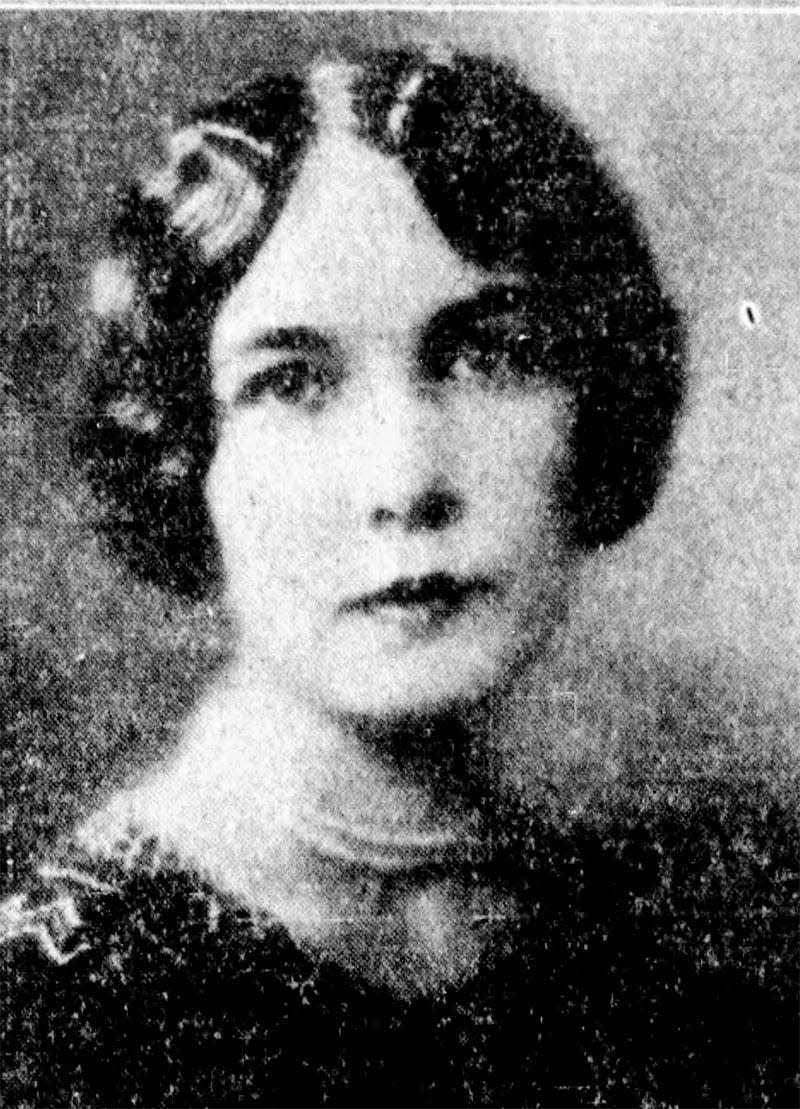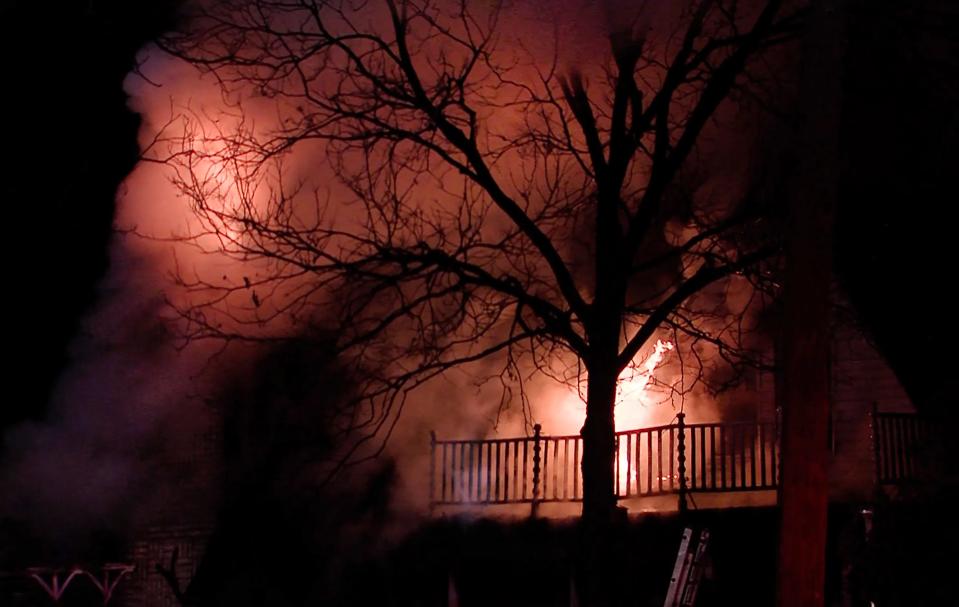If walls could talk this old WF mansion would tell of wealth, power - and murder
Pumpkins, witches and giant spiderwebs decorate the neighborhood for the haunting season, but among the neat, vintage homes on a quiet Wichita Falls street is one place that doesn’t need decoration to be a little scary.

It’s the kind of place you might choose to cross the street rather than pass. It’s the kind of place where Stephen King might pause for a second look.
On a corner, barely visible through gnarled limbs and withered branches, stands a mansion.
At least, it was a mansion once.
Most of the houses on McGregor Avenue are cozy cottages and bungalows, but the house on one corner is hardly that. Looming two stories, it’s twice the size of many of its neighbors.
It was built nearly 100 years ago. In the decades that followed, many people have trod its floors.
If walls could talk, these would have tales to tell.
When the 1920s roared in, Wichita Falls boomed with oil and money. The population was on its way to 60,000.
The Southland neighborhood west of Brook Avenue became the “in” place – the fashionable addresses where successful families lived and entertained. The big house on the corner was built when the nation was awash in bathtub gin and pork pie hats.
Charles P. McGaha was an independent oil producer and bank president. In the time his family lived in the home, it was a social center. When his bride, Clara Burgess McGaha, arrived from Oklahoma, she was welcomed with a “pretty tea” attended by 400 guests. The house was a setting for lavish parties as well as meetings of the First Presbyterian Missionary Society.

Thanks to some burglars who were caught red-handed, we’re left a glimpse of what was inside in 1928: a fur cape, a fur coat, six pairs of silk pajamas, a tuxedo, silver cufflinks, jewelry -- and a pair of Mr. McGaha’s underwear.
Perhaps the 3,000 square-foot house was too snug for a sociable tycoon. McGaha had other homes and other wives, finishing his life at a sprawling party house on Sarasue Lane where he spent the rest of his days entertaining the likes of John Wayne and Lyndon B. Johnson.
By the time World War II rolled around, another oil family had set up housekeeping in the mansion.
While J. Pickens Coleman conducted business, his wife busied herself with volunteer work at Wichita General Hospital and supporting the troops overseas. As president of the Unity Junior Club, Carobel Coleman announced in 1941 the club would forgo its annual holiday party and instead give the money to the Red Cross War Fund. Daughter Carolyn practiced her ballet to “Liebestraum” while son, Blair, went off to invade Okinawa with the Navy. He returned to Wichita Falls to become a prominent doctor.
When allied forces launched the D-Day invasion, J. Pickens Coleman opined to a reporter, “I’m sure our leaders waited for the right time to strike. I am confident of victory.”
The next oilman to move in was Ralph Bullington.
Bullington was something of a rarity, a Republican when yellow dog Democrats ruled Wichita Falls and Texas. As the 1948 presidential election approached, a GOP precinct meeting was held in the living room of the mansion. Guests at the house included Bullington’s cousin, Joza Lou. It’s easy to imagine Mr. Bullington having cocktails with his cousin’s young husband and discussing the rift among local Republicans over whether to nominate Dwight Eisenhower or Robert Taft for president. The young husband knew something about politics. John Tower was a political science professor at Midwestern University who would break the Democratic Party’s dominance in Texas by becoming the first Republican U.S. Senator since Reconstruction.

Devoutly Catholic, Mrs. Bullington – Myra Jane -- hosted ladies from Sacred Heart Church at the home and wrote a paper on “Modern Table Settings.”
In keeping with the oil tradition, the house passed on to another producer, Clarence Knight.
This was an era when names the likes of the McGahas, the Colemans, the Bullingtons and the Knights filled the business and society pages.
It was a different age. A time when the lady of the house in 1947 could advertise: “Female help wanted. White woman for care of children and general housework. Room and board furnished and excellent salary.”
The servants’ quarters were around back.
When the 60s arrived, trouble started.
William T. (Buddy) Knight resided in the home with his family. On a warm night in June 1962, Buddy Knight was driving by the YMCA on Ninth Street when he struck a woman who was getting into her own car. The 65-year-old woman, who died later at a hospital, was prominent in her own right. Miss Jane P. McCulloch was chairman of the Spanish Department at Wichita Falls High School, where she had taught for 39 years. Educator Joe B. McNiel was one of her pallbearers.
Knight was charged with Murder with Malice because he was suspected of being drunk. With four related counts against him, he could have been sentenced to death. After attempts to get a jury in the high-profile case failed, District Attorney Stanley Kirk filed for a change of venue. When the trial was finally held in Breckenridge a year later, the jury deliberated for two days. In the end, they found Knight guilty of murder.
They sentenced him to five years in prison.
Then they suspended the sentence.
Knight moved away and Kirk stuck around to become 78th District Court judge.
By 1965, the McGregor Street mansion was on the market as “Two-story, charming older home on a street of lovely residences. Priced for quick sale.” The price was $14,950 with a $950 down payment, or about $145,000 in today’s dollars. The agent admitted it needed “a little modernization.”
As owners and occupants came and went, the house settled into quiet old age – until Dec. 17, 2022. Before dawn that cold morning flames erupted. The occupants got out with minor injuries, but some pets perished.

That’s how the mansion’s story would end – if walls could talk.
On Tuesday, the Wichita Falls City Council is scheduled to order the demolition of the charred shell of the once-fine home. Ten other properties are also on the list of condemned.
Each might have its own stories to tell.
If walls could talk.
This article originally appeared on Wichita Falls Times Record News: If walls could talk this old WF mansion would tell of wealth, power - and murder

